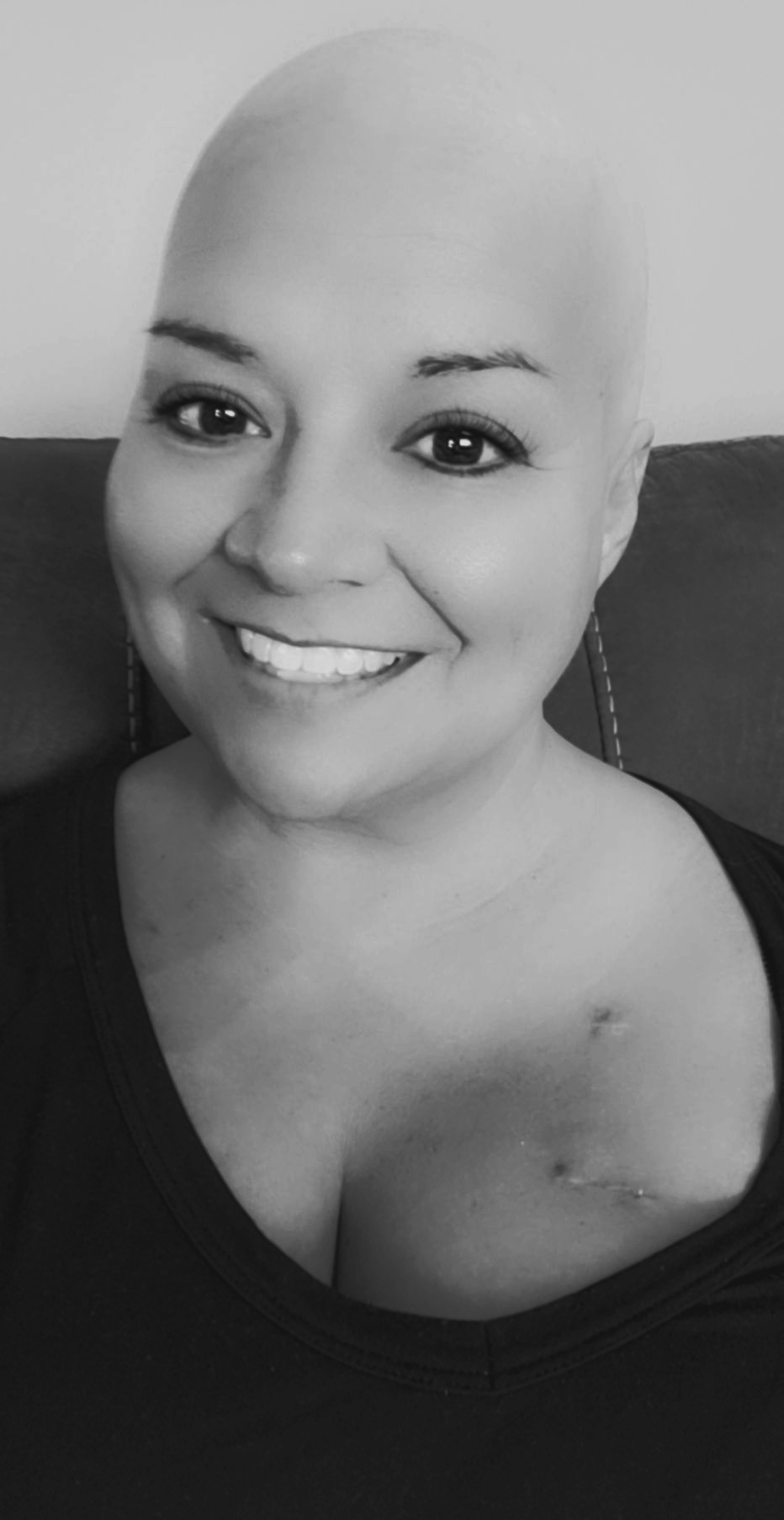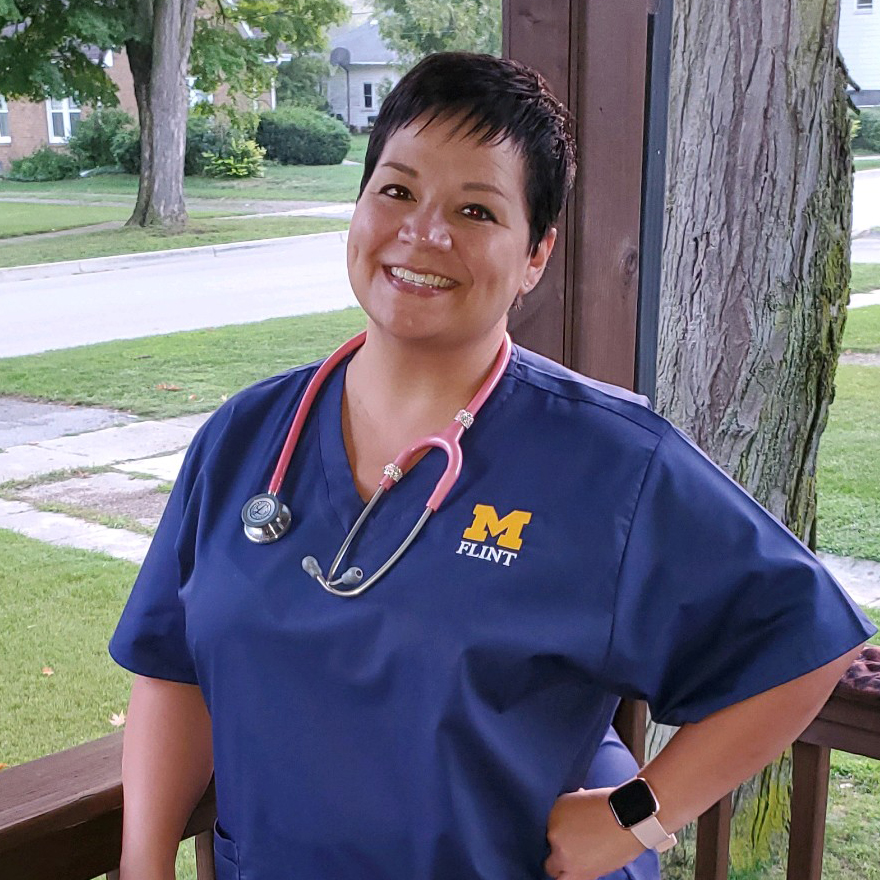 At the time of her diagnosis, Micaela Trevino stated she had no time to deal with a diagnosis of breast cancer. She worked full-time as a third shift sleep center technician, she was a full-time college student studying to become a registered nurse, and she was a single parent raising a 10-year-old son.
At the time of her diagnosis, Micaela Trevino stated she had no time to deal with a diagnosis of breast cancer. She worked full-time as a third shift sleep center technician, she was a full-time college student studying to become a registered nurse, and she was a single parent raising a 10-year-old son.
Even though her plate had been overflowing for many years, Micaela always managed to schedule an annual mammogram, and perform breast self-exams faithfully every month.
In December 2018, her self-exam looked good, she reports, however, in less than one month, that all changed, and Micaela’s life rapidly turned upside down. During her breast self-exam, she felt a “rock-hard lump the size of a ping pong ball,” she describes.
Around the same time, she fell on the ice outside her car and injured her arm. She was focused on healing from her fall and neglected to schedule an appointment right away to have her doctor check out the lump.
A couple of weeks later, when she saw her family physician (Damayanthi Pandrangi, MD), the doctor ordered a digital mammogram immediately.
As soon as the exam was completed, the radiologist wanted an ultrasound conducted. “I could see the tumor on the ultrasound and I just knew it was cancer,” Micaela reports. “The technician wanted to perform the test again, but before she could, the radiologist came in and told me I had an appointment for a biopsy the next day. They were moving so quickly; I knew it had to be bad news.”
When she met with Dr. Pandrangi after her biopsy, Micaela greeted her by saying, “It’s okay, I know what you are going to tell me. I already know.” Micaela could see the distress on her doctor’s face, knowing she had to confirm the diagnosis.
But the news was even worse. Micaela’s breast cancer was triple negative. This is a very aggressive form of cancer with a high rate of recurrence. The cancer team was assembled quickly – Rizwan Danish, MD, was her medical oncologist; Surgeon Raouf Mikhail, MD, would insert her port; Breast Surgeon Linsey Gold, DO, would conduct the surgery; and Plastic Surgeon Julie Sofer, DO, would perform the reconstructive surgery.
In less than two weeks from the time she received her diagnosis, the treatment plan not only was in place, but Micaela was undergoing chemotherapy treatments at Genesys Hurley Cancer Institute (GHCI).
Initially, she wondered how she was going to fit in her treatments with school, work and home responsibilities, but “I am a determined person and I would make it work,” she says with conviction.
 “I lost my hair – it was almost to my waist – but I proudly wore my baldness in public,” she announces. “And I used the three to four hours of treatment time to keep up on my schoolwork! I was disappointed, though. I finished the semester with a 3.8 GPA. I was aiming for a 4.0. The chemotherapy was affecting my study skills,” she notes.
“I lost my hair – it was almost to my waist – but I proudly wore my baldness in public,” she announces. “And I used the three to four hours of treatment time to keep up on my schoolwork! I was disappointed, though. I finished the semester with a 3.8 GPA. I was aiming for a 4.0. The chemotherapy was affecting my study skills,” she notes.
More bad news was thrown at Micaela. “I had a very severe migraine – so bad that I went to the ER on a Saturday night.” Her CT scan was clear, and when she followed up with Dr. Danish on Monday, he diagnosed her with shingles. He stopped the chemotherapy treatments and while Micaela was recovering, she contracted Bell’s Palsy.
A couple of weeks later, after she had recovered from shingles, Dr. Danish decided to move forward with Micaela’s surgery. “He was concerned that if I started my chemotherapy again, it might cause permanent facial paralysis (from Bell’s Palsy),” Micaela explains.
An MRI was conducted prior to her surgery, and Micaela faced bad news once again. The radiologist had found some lesions, suspecting the cancer had spread to her brain. Dr. Danish reassured her that it probably was Leptomeningeal disease, a rare complication of chemotherapy, but he wanted to confirm it through a spinal tap. It would take two weeks before she could see a neurologist, another week before the spinal tap could be scheduled, and one more week before she received the results.
“Now, the only thought on my mind was, ‘am I going to die?’
“I’m 43 years old, I have a 26-year old daughter and a 10-year old son; I can’t ask my daughter to take care of my son … I didn’t expect to be preparing for my death.”
Micaela cried for two weeks straight.
Finally, four long weeks later, the light at the end of the tunnel grew brighter for Micaela. The cancer had not spread. Inflammation from the shingles was causing the lesions and her severe migraines.
“I felt like the entire universe suddenly was lifted off my shoulders,” she sighs with tremendous relief.
The following day, Micaela scheduled her classes for the next semester.
On Sept. 4, Dr. Gold performed a lumpectomy, and on Sept. 5, Micaela started her first day of school. The tumor was undetectable, Dr. Gold reported. The initial chemotherapy treatments at GHCI had worked!
Micaela completed her final seven rounds of chemotherapy and went on to have 25 radiation treatments at GHCI “uneventfully,” she reports happily.
Her last treatment was in February, she is thrilled to announce. “Dr. Danish says I am cancer-free, and my prognosis looks promising. I applied to nursing school at U of M-Flint and I got in!
“Sometimes life takes you on the path you are supposed to go, even though you think you should be heading on a different one,” she reflects.
“I often think, ‘what in the world did I do to deserve this diagnosis? I have no family history of cancer on both sides of the family, I conduct breast self-exams every month and I have a mammogram every year. But I am healthy, and I am alive!
“I am so grateful I found such a great medical team to help me through my diagnosis and treatment,” she announces.
“I pray the cancer never will return, but it is so comforting to know Genesys Hurley Cancer Institute is the place for me to seek care – without question!” she reports.
“I chose to go for my treatments by myself at Genesys Hurley Cancer Institute,” she wants to add. “I knew it would be hard on my family to see me receiving treatments. Besides, I had so much support from the clinicians at Genesys Hurley Cancer Institute.
 “Everyone was wonderful, helpful and kind. They truly are there to help make a patient’s stay as comforting as possible.”
“Everyone was wonderful, helpful and kind. They truly are there to help make a patient’s stay as comforting as possible.”
The resources at GHCI were abundant, Micaela quickly learned. A social worker helped her with her finances, and GHCI – through its patient assistance fund – paid some of her bills.
“The enrichment classes offered for patients and their family members were a great way to meet other cancer survivors, share experiences and receive support,” Micaela finds. “It was helpful to be around others who were going through a similar experience.”
Micaela also wants to compliment Dr. Danish and his team. “The office staff was so willing to work around my schedule, they were responsive, and they were so personable and helpful.”
Micaela admits she still gets tired, and “I have ‘chemo brain.’ It takes me longer to study than it used to, but when I set a goal for myself, I will achieve it. Nothing will stand in the way, not even cancer!”
